The Vietnamese automobile market is undergoing a period of strong transformation, with a clear shift in consumer thinking. If in the past, Japanese and Korean cars were often the default choice thanks to their reliability and established brands, now users increasingly pay attention to experience, technology and practicality. In that context, the appearance of the Jaecoo J7 PHEV, a plug-in hybrid SUV from China, has become the center of attention and aroused much curiosity.
Modern appearance, bold urban SUV

The Jaecoo J7 PHEV has a square, modern boxy design, reminiscent of high-end SUVs like Land Rover. The front of the car stands out with sharp LED projector lights and a slim positioning strip. The elongated LED taillights, aerodynamic wheels and hidden door handles create a seamless, sophisticated look.

Details like the chrome window trim, roof rails, and large wheel arches show the level of investment in design. When standing next to it, the car feels beyond its price range, which is rare in models under 900 million VND.
Refined interior, many modern amenities

The interior space of the Jaecoo J7 PHEV is a significant step forward compared to the general level of Chinese cars. The large central screen, modern interface, comes with a digital clock cluster and HUD. Outstanding amenities include: electric driver's seat with cooling, wireless charging, dual-zone air conditioning, panoramic sunroof and a pretty good sound system.

However, some of the controls are fully integrated into the touchscreen, which can be a bit awkward for those unfamiliar with digital interfaces. In return, the rear seats are spacious and flexible with flat floors and reclining backrests, USB-C charging ports, and a two-tiered cargo area.
PHEV powertrain: Flexible and economical

Jaecoo J7 PHEV is equipped with a 1.5L turbocharged gasoline engine (141 horsepower), combined with two electric motors, of which the main motor has a capacity of 201 horsepower, torque of 310 Nm. The plug-in hybrid configuration allows the car to operate in three modes: pure electric, series hybrid and parallel hybrid.

The highlight of this powertrain is the 18.3 kWh lithium-ion battery pack, which is significantly larger than conventional HEV models, allowing the car to operate purely on electricity for 100–137 km per full charge, a distance suitable for most daily urban travel needs.
When the battery is low or if extra power is needed, the gasoline engine automatically kicks in to assist the motor or recharge the battery. The vehicle also features regenerative braking to help save energy and improve efficiency.
Driving Experience: Balance between Comfort and Stability
The electric power steering feels light in the city and steady at high speeds. The 2.7-turn ratio ensures the necessary precision. The MacPherson front and multi-link rear suspension help the car operate stably and smoothly at low speeds and maintain good balance when moving quickly.
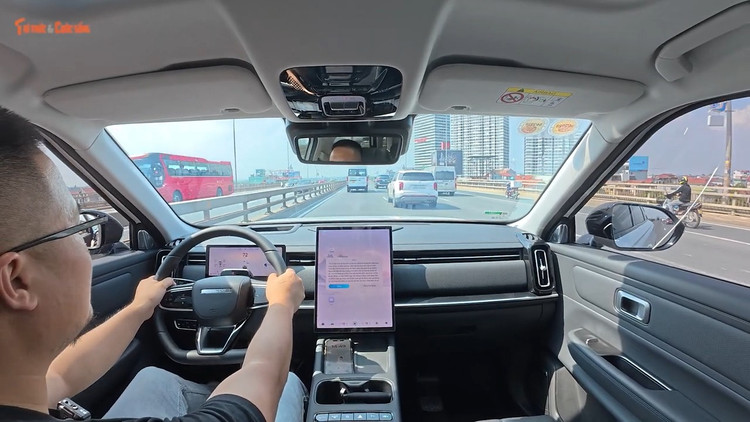
The monocoque chassis and suspension design help the vehicle not to sway when turning suddenly or carrying a full load. This is a plus for comfort and a sense of security on long journeys.
Soundproofing ability is quite good in the segment
The Jaecoo J7 PHEV is equipped with double-glazed glass for the front seats and a fairly soundproof body. Practical experience shows the ability to significantly eliminate noise when moving in the city. On the highway, wind and tire noise are still controlled at an acceptable level, not affecting the quietness in the cabin much.
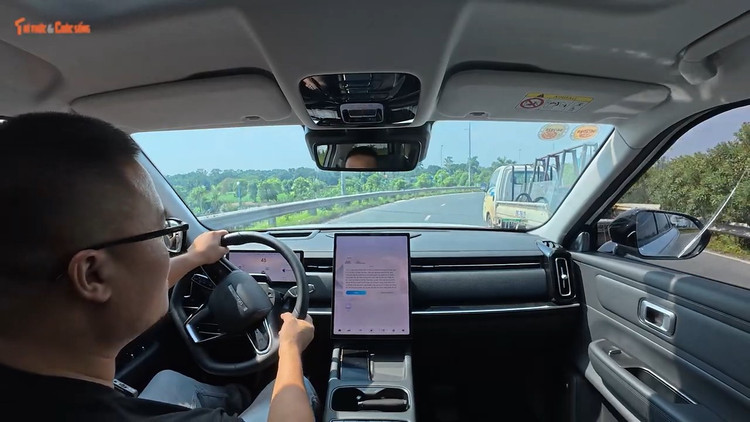
This is a factor that is often cut in many car models in the price range under 900 million VND, but Jaecoo has invested properly, creating a positive impression.
Equipped with many safety technologies to support the driver

The Jaecoo J7 PHEV features a rich list of safety technologies, including:
- ABS, EBD, BAS brake assist
- Electronic balance, traction control;
- Hill start assist, hill descent control;
- 540 degree camera, front/rear sensors;
- Blind spot warning, rear cross traffic alert.
- Adaptive cruise control, lane departure warning, lane keeping assist,...
Although it is a new brand in Vietnam, the company is still fully equipped with necessary technology, meeting the needs of moving in urban and long-distance environments.
Advantages of PHEV cars in Vietnam and brand challenges
In terms of usage, the PHEV configuration of the Jaecoo J7 is suitable for Vietnam's infrastructure, where public charging stations still have many limitations. Users can charge at home, travel entirely on electricity during the day, and use the gasoline engine when needed. This is a flexible solution that is both environmentally friendly and economical .

However, Jaecoo’s challenges lie not in the product but in the brand. Being a new name, with Chinese origins, makes consumers still hesitant. The three main factors that need to be addressed are: long-term reliability, transfer value and after-sales system. These are the criteria that car buyers in Vietnam are particularly interested in.
The Jaecoo J7 PHEV is a notable model in the SUV segment under VND 900 million. Its modern design, flexible plug-in hybrid powertrain, comfortable interior space and good soundproofing help this model stand out from many competitors in the same price range.

However, to convert interest into purchase, Jaecoo needs to prove its durability, real quality and build trust from Vietnamese users, which cannot be achieved overnight. With PHEV as a suitable intermediate solution for the transition to electric vehicles, Jaecoo J7 PHEV has potential, but success will depend on the company's long-term strategy in the Vietnamese market.
Source: https://khoahocdoisong.vn/jaecoo-j7-phev-suv-trung-quoc-co-gi-thach-thuc-xe-nhat-han-post2149041888.html





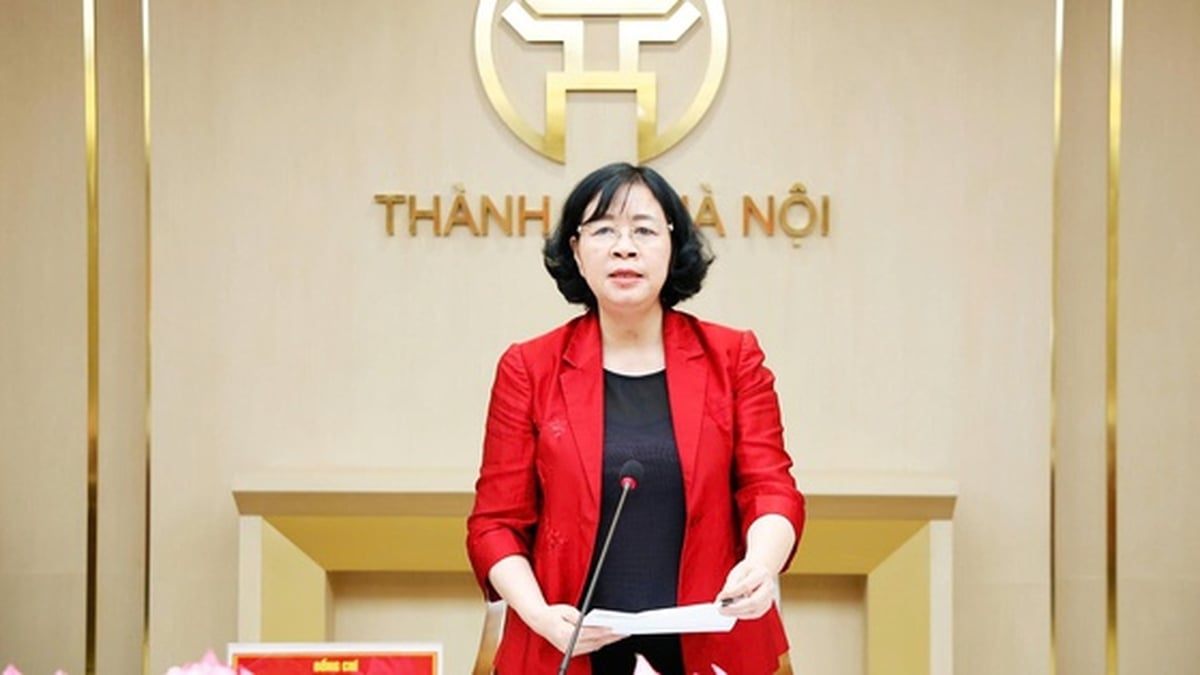









































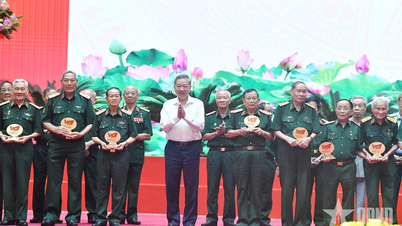





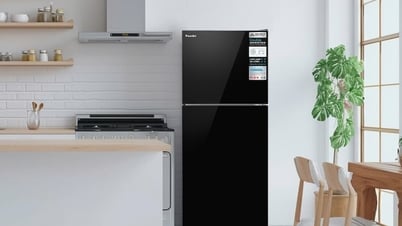















































Comment (0)